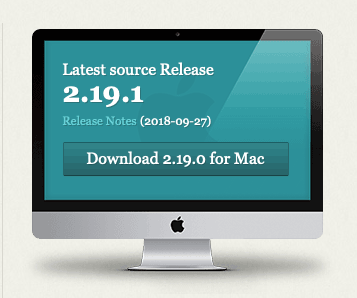Download the latest version of the Dolphin Emulator (5.0-13901) from the official website. Beta versions are released every month. Windows x64 macOS Android. Earlier versions of Tux Paint are available, which run on older versions of Mac OS X / OS X / macOS. January 12, 2021 - Tux Paint 0.9.25 is also now available for a variety of Linux distributions via Flatpak. Download CCC 3.5.7 for use on Snow Leopard (10.6) and Lion (10.7). Download CCC 3.4.7 for use on Tiger (10.4) and Leopard (10.5). CCC 3.4.7 and 3.5.7 are provided as-is; we regret that we cannot offer any support for the installation or use of these older versions of CCC.
Carbon Copy Cloner requires macOS. CCC will not run on Windows.
Click here for older versions. We maintain a flathub app. We recommend installing nomacs from there if you want to have the latest version. Ubuntu and Linux Mint. Nomacs is available in the “universe” repository of Ubuntu. Just install it using your favorite package manager. Translations can be added with sudo apt-get install. Audacity 3.0.0 for macOS is now a 64-bit application. If you use the optional FFmpeg library you will need to download the 64-bit versions of them. Installation of Audacity. Double-click the downloaded DMG to mount it. Drag the “Audacity.app” icon in the DMG window to the /Applications folder icon on the right.
Carbon Copy Cloner 5 is the latest version available. Users running Yosemite (10.10), El Capitan (10.11), Sierra (10.12), High Sierra (10.13), Mojave (10.14), or Catalina (10.15) should use this version of CCC. If you are having trouble downloading CCC from the link above, try this alternate download location.
Upgrading from CCC 4? CCC 5 is a paid upgrade. CCC 4 Personal and Household licenses purchased prior to May 22, 2017 are eligible for upgrade pricing. When you open CCC 5, it will automatically retrieve your new license or an upgrade coupon that you can use to purchase CCC 5 at 50% off. CCC 4 licenses purchased on or after May 22, 2017 are eligible for a free CCC 5 upgrade license.
CCC 5: Support for macOS 11 Big Sur
CCC 5.1.22 (and later) is qualified for macOS 11 Big Sur. Open CCC and choose 'Check for updates...' from the Carbon Copy Cloner to get the update, or click the 'Download CCC 5' button above. Please take a moment to review the following resources prior to upgrading to macOS Big Sur:

Carbon Copy Cloner 4.1.24 is compatible with Mountain Lion (10.8), Mavericks (10.9), Yosemite (10.10), El Capitan(10.11), Sierra (10.12) and High Sierra (10.13). Note that while this version of CCC may work on El Capitan and newer OSes, we recommend that El Capitan+ users upgrade to CCC 5. We offer technical support for CCC 4, but we are no longer actively developing it. If you are having trouble downloading CCC from the link above, try this alternate download location.
CCC 4 and Mojave+: CCC 4 is qualified up to macOS High Sierra. CCC 4 license holders are welcome to continue using CCC 4 on later OSes with the understanding that this is an untested and unsupported configuration. CCC 5 is fully qualified on macOS Mojave and offers extensive support for APFS, including support for point-in-time restores via APFS filesystem snapshots.
Unsupported Versions
Download CCC 3.5.7 for use on Snow Leopard (10.6) and Lion (10.7). Download CCC 3.4.7 for use on Tiger (10.4) and Leopard (10.5). CCC 3.4.7 and 3.5.7 are provided as-is; we regret that we cannot offer any support for the installation or use of these older versions of CCC.
If you're on Linux or a BSD variant, you can install GStreamer using yourpackage manager.
For other platforms, specifically Windows, macOS,Android, and iOS, we provide binary releases inthe form of official installers or tarballs maintained by the GStreamerproject.
Windows
Binary releases in the form of MSI installers are available. The installers aresplit into runtime and development packages. For development, you will want toinstall both packages.
- MSVC 64-bit (VS 2019, Release CRT)
- MSVC 32-bit (VS 2019, Release CRT)
- MinGW 64-bit
- MinGW 32-bit
For each of the above listed targets, a zip file with .msm modulesis available for integration into your own WiX-based app installer.
If you are not sure which to pick between MSVC and MinGW, just pick MSVC.However, do see the toolchain compatibility notesbelow which may affect you based on what toolchain your app will be built with.
NOTE: The library names in MSVC are different from MinGW; specifically the DLLsare of the form foo.dll instead of libfoo.dll.
NOTE: GstSharp .NET bindingsrequire the MSVC binaries starting with 1.18.
NOTE: Some of the plugins shipped with the MSVC binaries link to non-gstreamerlibraries built with MinGW because they are built with Autotools. See belowfor what this means for your application.
Older 1.x binary releases are also available.
Universal Windows Platform
Binary releases built to target the Universal Windows Platform (UWP). Used forshipping apps on the Windows Store, such as for an XBox, HoloLens 2, etc.
- UWP Universal (ARM64, X86, X86_64) (VS 2019, Release CRT)
- UWP Universal (ARM64, X86, X86_64) (VS 2019, Debug CRT)
UWP apps cannot use plugins that use dependencies built with MinGW because offorbidden APIs. Hence, these plugins are omitted from the binaries.
Toolchain Compatibility Notes
On Windows, you can use a number of different toolchains and versions thereof,and it is not always obvious how these can be mixed and matched with thebinaries provided above by GStreamer.
The first step is ensuring that you're using the correct architecture. Youshould not try to mix 32-bit code built with any toolchain with 64-bit codebuilt with any toolchain.
Next, understand that since GStreamer is written mostly in C, all APIs exportedby GStreamer libraries and plugins use C ABIs. Even plugins written in otherlanguages such as Rust, C++, C#, Python, etc, are loaded using the C ABI.
This means you can consume the GStreamer binaries from any toolchain that usesthe same C ABI. Using the same CRT (C Runtime)is better, but it's not always a requirement. Here's the matrix outlining theCRT used for each GStreamer version:
| GStreamer version | MinGW | MSVC |
|---|---|---|
| 1.14.x | msvcrt.dll | N/A |
| 1.16.x | msvcrt.dll | ucrtbase.dll |
| 1.18.x | ucrtbase.dll | ucrtbase.dll |
This is the toolchain compatibility matrix with the stable releases:
| App Toolchain | 1.16 MinGW | 1.16 MSVC | 1.18 MinGW | 1.18 MSVC |
|---|---|---|---|---|
| Visual Studio 2015 and newer (ucrtbase.dll) | PARTIAL | FULL | FULL | FULL |
| Visual Studio 2013 and older (msvcrt.dll) | PARTIAL | PARTIAL | PARTIAL | PARTIAL |
| MinGW (msvcrt.dll) | FULL | PARTIAL | PARTIAL | PARTIAL |
| MinGW-w64 (msvcrt.dll) | FULL | PARTIAL | PARTIAL | PARTIAL |
| MSYS2 MinGW-w64 (msvcrt.dll) | FULL | PARTIAL | PARTIAL | PARTIAL |
| Cygwin | NONE | NONE | NONE | NONE |
FULL means full C compatibility, including debugging symbols.
PARTIAL means mixing the two should be fine as long as you are careful whilepassing memory across CRT boundaries.
NONE means fully unsupported, and will lead to crashes.
macOS
Binary releases in the form of .pkg framework installers are available. Theinstallers are split into runtime and development packages. For development,you will want to install both packages.
- macOS 64-bit (target: macOS 10.11)
- macOS 64-bit (target: macOS 10.10)
GStreamer is also available on Homebrew, and you should beable to use that. However, please note that some plugins are not shipped byHomebrew, and you should avoid mixing Homebrew and the official installers onthe same system.
Older 1.x binary releases are also available.
Android

Binary releases are available with each in the form of a single 'universal'tarball with armv7, arm64, x86, and x86_64 architectures in subfolders.
- Android Universal 1.18.4 tarball
- Android Universal 1.16.3 tarball
The Android NDKs used by the stable releases are:
| GStreamer version | NDK Version |
|---|---|
| 1.16.x | r18b |
| 1.18.x | r21 |
The Android APIs targeted by the GStreamer 1.16.x and 1.18.x stable release(s) are:
| Architecture | API Targeted |
|---|---|
| armv7 | v16 (Jelly Bean) |
| x86 | v16 (Jelly Bean) |
| arm64 | v21 (Lollipop) |
| x86_64 | v21 (Lollipop) |
Older 1.x binary releases are also available.
Download Older Version Of Macos High Sierra
iOS
Binary releases that integrate into XCode are available in the form of a single'universal' package with fat library frameworks. Bitcode support is built-inand the target SDK version for 1.16.x was iOS 9.0, and for 1.18.x is 11.0.
- iOS Universal 1.18.4 framework (ARM64, X86_64)
- iOS Universal 1.16.3 framework (ARM64, X86_64, X86)

Older 1.x binary releases are also available.
How To Download Older Versions Of Macos
Linux and BSDs
All Linux distributions and many BSD variants provide packages of GStreamer.You will find these in your distribution's package repository.
Note that some distributions split the GStreamer plugins up further than theupstream sources. Additionally, some distributions do not include some pluginsfrom the gst-plugins-bad package, or omit the gst-plugins-ugly and gst-libavpackages entirely in their main repository for legal reasons.
Sources
For building the aforementioned binary releases, you need to use the Cerberobuild aggregatormaintained by the GStreamer project which supports Linux, macOS, and Windows.
For downloading each GStreamer module individually, check our modulespage, or go straight to our source download directory.
Generally, you should not need to build from source yourself unless you needfeatures that are only available in a newer version of GStreamer than isprovided by your distribution or in the last stable release.
For doing GStreamer development, we recommend using the gst-buildproject whichwill aggregate all the GStreamer modules using Meson's subprojectfeature.
